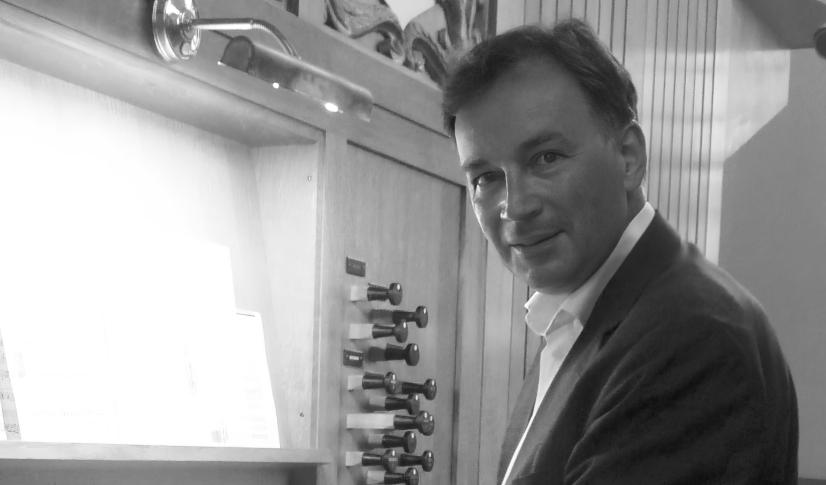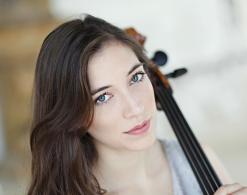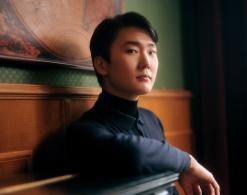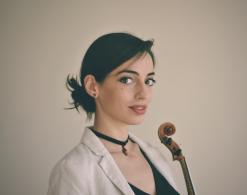Andreas Liebig: Every piece of music can be a revelation
An excitingly diverse program, outstanding artists, and some of the most beautiful organs in Poland: the autumn edition of the Organy+ Festival will be a treat for lovers of the king of instruments. Martyna Wlodarczyk spoke with organist Andreas Liebig, who will perform on Friday, October 14, at the St. John Bosco Church in Gdansk's Orunia district.
Martyna Włodarczyk: You are active as a concert musician and at the same time work as the cathedral organist in Basel. Is there a difference in how you conceive of music when you play the organ as part of a religious liturgy and when you play a secular recital?
Andreas Liebig: As the cathedral organist in Basel, I may provide the music for the services at the organ—in collaboration with the reverends, the pastors. It is always a demanding challenge to contribute to the congregation gaining an inkling of the heavenly liturgy.
At the same time, as artistic director, I am responsible for planning and organizing about 35 organ recitals a year on the largest and most versatile organ in the region in the magnificent sound space of the Basel Cathedral.
It is important to me that both the music in the service and the repertoire of the concerts correspond to the church year. In the services, it goes without saying that the order of pericopes must be observed, i.e. the psalms, Old and New Testament readings and the hymns of the week that have been provided for by the church since time immemorial. As you may know, the Reformed liturgy is not as rich as the Catholic or the Lutheran. In the Reformed, the preaching of the WORD (written with big letters!) with sermons usually lasting up to 25 minutes (sic!) is in the foreground, but congregational singing is nevertheless important and is also cultivated extensively and with great enthusiasm in the Basel Cathedral. By the way: For some strictly Reformed persons, substantial psalms and songs can even "save" a service with a weak sermon. It is generally expected that at least one substantial work by Bach is heard in every service, be it a chorale prelude or a prelude & fugue. Please remember: some of my predecessors were such renowned musicians as Straube's pupil Adolf Hamm from Strasbourg or Eduard Müller, Gustav Leonhardt's teacher.
However, organ music has more of a service function in the Reformed church, even though the pastors sometimes ask me to improvise spontaneously on certain texts. And believe it or not, improvisation in avant-garde sound, e.g. with clusters à la Ligeti's Volumina, is by no means condemned by the church authorities.
It is also a great concern of mine to create free space in liturgy and concert, so that the Basel Cathedral continues to radiate as a cultural power plant (“Kulturelles Kraftzentrum” so to say) in the city and the region. If you study the programmes of recent years, they read like a „who's who” of the international organ scene. I always consciously invite colleagues who might play in a completely different way from me, who focus on completely different repertoire, and I definitely encourage them to put unknown works on the programme. This year we had "Strong women as guests", four Danish female cathedral organists alone! For the audience, these are often new discoveries, exciting and diverse, like life itself. At least that was the case before "Corona", people flock to the concerts in much greater numbers than to the rather "dry" Reformed services. The difference, then, is the greater artistic freedom I have in the programming of the concerts. What we have in common is the commitment to quality and the spiritual orientation that is indispensable for me in every case: Soli Deo gloria („Glory to God Alone”).
Your program in Gdansk consists of late romantic organ works by Brahms and Dvorak. What propelled you to choose these pieces?
Well, first came the kind invitation and request from Mr Szadejko to build an ORGAN + programme around this year's celebrator Brahms. We commemorate the 125th anniversary of his death. My wife Gudrun Sidonie Otto is an internationally renowned soprano with an unusually broad repertoire. We spontaneously thought of Antonin Dvorak, who as a pupil of Brahms was highly esteemed and encouraged by him. Sidonie and I had long wanted to perform the Biblical Songs op. 99 in their entirety. So the idea was born to link the two cycles together. Both are, in a sense, "swan songs", works of maturity and farewell. Brahms' chorale preludes were only published posthumously in 1909 as op. 122. They are his swan song, so to speak. He composed the first five in Bad Ischl in May 1896, after learning of Clara Schumann's stroke, and the remaining six after returning from her funeral - probably also anticipating his own death. Brahms worked intensively on the organ twice, and both times in connection with Clara – his great love. The early works—the two preludes and fugues in A minor and G minor, the chorale prelude "O Traurigkeit, o Herzeleid" (O Sadness, O Heartache) and the wonderful fugue in A flat minor— are the fruits of the counterpoint studies and exercises he did together with Joseph Joachim, probably also in order to control his troubled soul in the tension between his great love for Clara and his friendship with Robert. And then there is the mourning over Clara's passing. Brahms dealt with folk songs twice too, at the very beginning and at the end of his life. The chorales, finally, are really the folk songs of the Lutheran church. Incidentally, the following saying is handed down from Dvorak, who was a believer: "Johannes Brahms, such a great man, such a great soul - and yet he believes in nothing!" I wonder if this is really true. At least Brahms was not a dogmatist!
Dvorak's Biblical Songs were written in 1894 in New York within a very short time instead of a planned symphony. His eighty-year-old father had been seriously ill for a long time and finally died on 28 March 1894, two days Dvorak completed the Biblische Lieder. Dvorak was plagued by homesickness. The inevitable confrontation with life and death made him find refuge and consolation in the Psalms. Thus our programme will be permeated by a dialectical tension on various levels: life and death; love and loss; pain and consolation.
Both Brahms’s Chorale Preludes op. 122 and Dvorak’s Biblical Songs op. 99 have a strong religious context. Do your own religious convictions influence the way you work on these pieces?
Is there any music that does not strive for the highest, for transcendence of material limitations? Brahms has, very much in the spirit of Bach, this compositional concentration on the essential: every note is animated (here - “beseelt”)!), a deep melancholy and longing prevails. And Dvorak sometimes enchants with a certain - in a positive sense - naïve, layered piety. The one, for all his depth of soul, is a North German sober, unpretentious Protestant, turned inwards, the other a Catholic cosmopolitan with a sense for sensuous folk music and indulgent Wagnerian harmonies. In this respect, it is a privilege to be able to delve intensively into these complementary attitudes of the soul.
Thirty years ago, I played all of Brahms' organ works every year in very different places, including the Irish premiere in Dublin. It was moving when, after the last chorale "O Welt, ich muss dich lassen" (O world, I must leave you) with its line-by-line echo effects fading into nothingness, the audience remained in silence for minutes and finally left the church in silence. Thanks to the invitation from Gdansk, I am once again on a voyage of discovery in this cosmos of intimately sparkling diamonds, in which the music finds itself completely. Therefore, it is not at all about my own convictions (dogmas are unnecessary ballast, whether theologically, in respect of performance-practice or even politically!), but about opening up to the spiritual richness that resonates in the masterpieces of great souls.
Among Brahms’s eleven chorales and Dvorak’s ten Biblical Songs, is there one that is especially close to you and that you would like to introduce to our readers?
The Trois Chorales of César Franck (another celebrator this year!) are another example of a musical testament par excellence, of a "swan song". A colleague, the Cologne Cathedral organist Winfried Bönig, recently asked me, after I played Franck's first chorale in E major in the mighty Cologne Cathedral, which of the these three quarter-hour chorales I would take to a desert island. "I don't know, I love all three of them." - "Yes, but you have to choose. You're only allowed to take one. There are actually three types of organists, some choose this one, some that one, and those yet another." I stick with it: I can't make up my mind. All of them are a tremendous enrichment. This is as true of the chorale preludes by Brahms (the best thing in this genre written since Bach!) as it is of the Biblical Songs by Dvorak. Nevertheless, numbers 4 (Herzlich tut mich erfreuen) or 10 (Herzlich tut mich verlangen) with their ingenious adaptation of the highly differentiated Brahmsian piano figuration to the organ, or the rapturously floating number 5 (Schmücke dich, o liebe Seele) with its perfect three-part polyphony in the lucid Christ key of E major, and the ethereal number 6 (O wie selig seid ihr doch, ihr Frommen) are of enchanting beauty. And in the case of Dvorak, it is especially number 3, Gott erhör mein inniges Flehen (Psalm 55), which touches me deeply.
As a performing musician, be it as a church musician or as a concert organist, I always try to be fully present, fully open in music-making, and then every piece of music is – or at least can be – a revelation.





